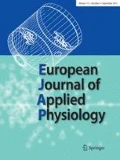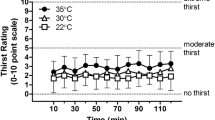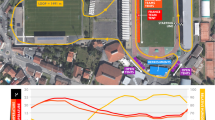Summary
To prevent thermal injuries during distance running, the American College of Sports Medicine proposes that between 0.83 and 1.65 l of water should be ingested each hour during prolonged exercise. Yet such high rates of fluid intake have been reported to cause water intoxication. To establish the freely-chosen rates of fluid intake during prolonged competitive exercise, we measured fluid intake during, body weight before and after, and rectal temperature after competition in a total of 102 runners and 91 canoeists competing in events lasting from 170–340 min. Fluid intakes during competition ranged from 0.29–0.62 l · h−1; rates of water loss ranged from 0.69–1.27 l · h−1 in the runners; values were lower in the canoeists. Mean post-race rectal temperatures ranged from 38.0–39.0° C. There was no relationship between the degree of dehydration and post-race rectal temperature. We conclude that hyperthermia is uncommon in prolonged competitive events held in mild environmental conditions, and that exercise intensity, not the level of dehydration, is probably the most important factor determining the postexercise rectal temperature. During prolonged exercise in mild environmental conditions, a fluid intake of 0.5 l · h−1 will prevent significant dehydration in the majority of athletes.
Similar content being viewed by others
References
Adams WC, Fox RH, Fry AJ, MacDonald IC (1975) Thermoregulation during marathon running in cool, moderate and hot environments. J Appl Physiol 38:1030–1037
American College of Sports Medicine (1985) Position statement on the prevention of thermal injuries during distance running. Med Sci Sports Ex 16:ix-xiv
Armstrong LE, Costill DL, Fink WJ (1985) Influence of diurectic-induced dehydration on competitive running performance. Med Sci Sports Ex 17:456–461
Blake JB, Larrabee RC (1903) Observations upon long distance runners. Boston Med Surg J 148:195–206
Cohen I, Zimmerman AL (1978) Changes in serum electrolyte levels during marathon running. S Afr Med J 53:449–453
Costill DL (1972) The physiology of marathon running. JAMA 221:1024–1029
Costill DL (1972) Fluid replacement during and following exercise. In: Alexander JF, Serfass RC, Tipton CW (eds). Fitness and exercise. Chicago, Athletic Institute
Costill DL, Kammer WF, Fisher A (1970) Fluid ingestion during distance running. Arch Environ Health 21:520–525
Dancaster CP, Whereat SJ (1971) Fluid and electrolyte balance during the Comrades Marathon. S Afr Med 45:147–150
Gisolfi CV, Copping JR (1974) Thermal effects of prolonged treadmill exercise in the heat. Med Sci Sports Ex 6:108–113
Godlonton JD (1985) Comrades Marathon — setting the facts straight. S Afr Med J 68:291
Hiller WDB, O'Toole ML, Laird RH, Burch R, Travis M, Massimino AF, Medoff RJ (1986) Electrolyte and glucose changes in endurance and ultraendurance exercise: results and medical implications. Med Sci Sports Ex 18:S62-S63
Hughson RL, Staudt LA, Mackie JM (1983) Monitoring road racing in the heat. Physc Sportsmed 11 (May):94–105
Jardon OM (1982) Physiological stress, heat stroke, malignant hyperthermia — a perspective. Mil Med 147:8–14
Leger L, Mercer D (1984) Gross oxygen cost of horizontal treadmill and track running. Sports Med 1:270–277
Magazink A, Shapiro Y, Meytes D, Meytes I (1974) Enzyme blood levels and water balance during a marathon race. J Appl Physiol 36:214–217
Maron MB, Horvath SM (1978) The marathon: a history and review of the literature. Med Sci Sports 10:137–150
Maron MB, Horvath SM, Wilkerson JE (1975) Acute blood biochemical alterations in response to marathon running. Eur J Appl Physiol 34:173–181
Maron MB, Wagner JA, Horvath SM (1977) Thermoregulatory responses during competitive marathon running. J Appl Physiol 42:909–914
Maughan RJ (1985) Thermoregulation in marathon competition at low ambient temperature. Int J Sports Med 6:15–19
Maughan RJ, Leiper JB, Thompson J (1985) Rectal temperature after marathon running. Br J Sports Med 19:192–196
Mitchell JW, Nadel ER, Stolwijk JAJ (1972) Respiratory water losses during exercise. J Appl Physiol 32:474–476
Myhre LG, Hartung GH, Tucker DM (1982) Plasma volume and blood metabolites in middle-aged runners during a warm weather marathon. Eur J Appl Physiol 48:227–240
Myhre LG, Hartung GH, Nunneley SA, Tucker DM (1985) Plasma volume changes in middle-aged male and female subjects during marathon running. J Appl Physiol 59:559–563
Noakes TD (1982) Heatstroke during the 1981 National Cross-Country running championships. S Afr Med J 61:145
Noakes TD, Goodwin N, Rayner BL, Brankin T, Taylor RKN (1985a) Water intoxication: A possible complication during endurance exercise. Med Sci Sports Exerc 17:370–375
Noakes TD, Lambert EV, Lambert MI, McArthur PS, Myburgh KH, Benade AJS (1988) Carbohydrate ingestion and muscle glycogen depletion during marathon and ultramarathon racing. Eur J Appl Physiol (in press)
Noakes TD, Nathan M, Irving RA, van Zyl Smit R, Meissner P, Kotzenberg G, Victor T (1985b) Physiological and biochemical measurements during a 4-day surf-ski marathon. S Afr Med J 67:212–216
Olsson K-E, Saltin B (1970) Variations in total body water with muscle glycogen changes in man. Acta Physiol Scand 80:11–18
Owen MD, Kregel KC, Wall PT, Gisolfi CV (1986) Effects of ingesting carbohydrate beverages during exercise in the heat. Med Sci Sports Ex 18:568–575
Pugh LGCE, Corbett JL, Johnson RH (1967) Rectal temperatures, weight losses, and sweat rates in marathon running. J Appl Physiol 23:347–352
Robinson S (1963) Temperature regulation in exercise. Pediatrics 32:691–702
Saltin B, Hermansen L (1966) Esophageal, rectal, and muscle temperature during exercise. J Appl Physiol 21:1757–1762
Shephard RJ, Kavanagh T (1978) Fluid and mineral needs of middle-aged and post-coronary distance runners. Physc Sportsmed 6:90–102
Sjodin B, Svedenhag J (1985) Applied physiology of marathon running. Sports Med 2:83–99
Van Rensburg JP, Kielblock AJ, Van der Linde A, Van der Walt WH (1986) Physiological responses to a rugby match. S Afr J Res Sport Phys Ed Rec 7:47–57
Wells CL, Schrader TA, Stern JR, Krahenbuhl GS (1985) Physiological responses to a 20-mile run under three fluid replacement treatments. Med Sci Sports Ex 17:364–369
Wyndham CH (1977) Heatstroke and hyperthermia in marathon runners. Ann NY Acad Sci 301:128–138
Wyndham CH, Strydom NB (1969) The danger of an inadequate water intake during marathon running. S Afr Med J 43:893–896
Author information
Authors and Affiliations
Rights and permissions
About this article
Cite this article
Noakes, T.D., Adams, B.A., Myburgh, K.H. et al. The danger of an inadequate water intake during prolonged exercise. Europ. J. Appl. Physiol. 57, 210–219 (1988). https://doi.org/10.1007/BF00640665
Accepted:
Issue Date:
DOI: https://doi.org/10.1007/BF00640665




